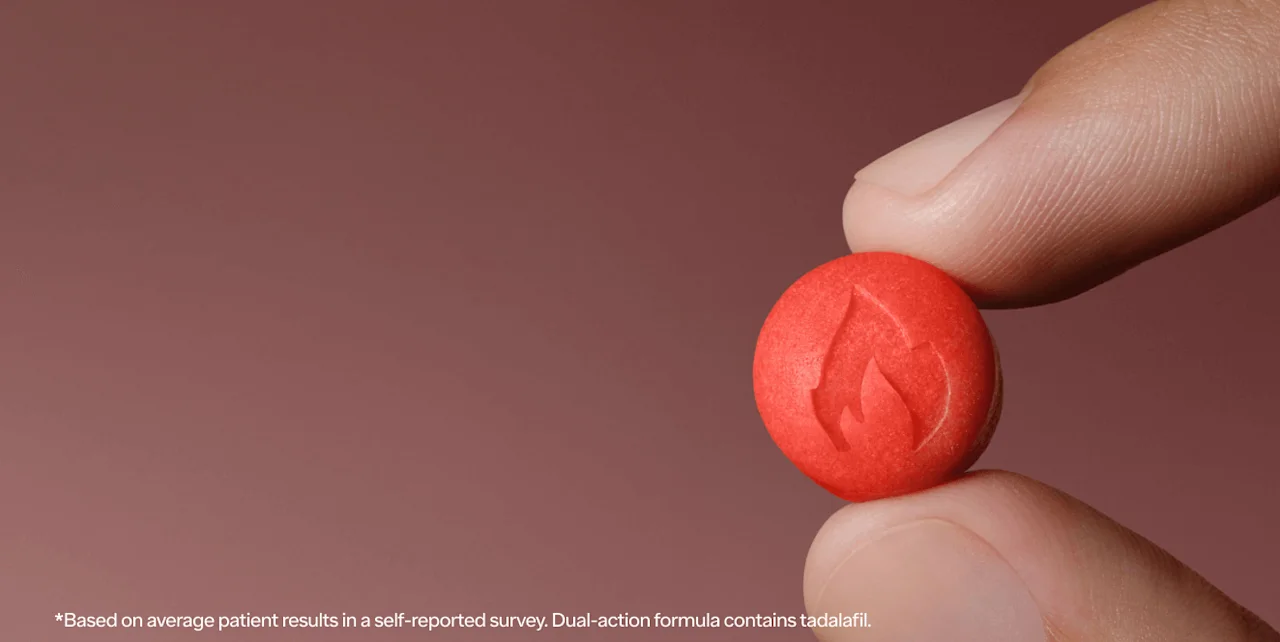Here's what we'll cover
If you have erectile dysfunction (ED) and your healthcare provider has recommended an ED medication, you’re probably wondering what the differences are between the options on the market. In this article, we’ll look at two commonly prescribed ED medications: Viagra and Levitra.
How do Viagra and Levitra work?
Viagra (sildenafil) and Levitra (vardenafil) belong to a class of drugs called PDE5 inhibitors, which are commonly used to treat erectile dysfunction (ED). PDE5 inhibitors work by relaxing blood vessels in the penis and signaling the blood vessels to stay dilated longer. This allows for increased blood flow to the penis and stronger, longer-lasting erections. Other PDE5 inhibitors include tadalafil (brand name Cialis) and avanafil (brand name Stendra). It’s important to note that ED medications are not magic pills–all of these drugs require arousal and sexual stimulation to work effectively.
Note: The brand-name form of Levitra was discontinued in 2021. However, the active ingredient, vardenafil, is still available as a generic medication.
What are the key differences between Viagra and Levitra?
Both Viagra and Levitra are highly effective at treating erectile dysfunction. However, there are a few key differences to consider when choosing the medication that’s right for you. Here’s what you should know about the differences between Viagra and Levitra:
Both Viagra and Levitra are intended to be short-term treatments for erectile dysfunction taken on an as-needed basis. While the effects last for a similar amount of time, Levitra may last slightly longer than Viagra. Some studies have shown Levitra can work for up to 8 hours after taking the medication, although the effects usually begin to fade 4 hours after taking the pill. The effects of Viagra typically last for at least 4 hours after taking the pill, and the effects begin to fade after 3-4 hours.
If Viagra is taken with a high-fat meal, it may take longer to feel the effects of the medication. Levitra, however, is not significantly impacted by food. That means you can take Levitra with a meal and shouldn’t notice a change in how long it takes for the medication to work.
Viagra is available in 25 mg, 50 mg, or 100 mg oral tablets, and Levitra in 2.5 mg, 5 mg, 10 mg, and 20 mg oral tablets.
| Viagra | Levitra |
Generic form | sildenafil | vardenafil |
What does it treat? | Erectile dysfunction Pulmonary arterial hypertension (under the brand name Revatio) | Erectile dysfunction |
How to take it | Take 30-60 minutes before sexual activity; effects last about 4 hours | Take 30-60 minutes before sexual activity; effects last about 4 hours |
Most common side effects | Headaches, facial flushing, indigestion/heartburn, back pain, stuffy nose, nausea | Headache, runny nose, flushing, heartburn (dyspepsia), flu-like symptoms, nausea, dizziness/lightheadedness, back pain |
Risk of priapism? | Yes | Yes |
Food | Can take with or without food; high fat meal may make it take longer to work | Can take with or without food; high fat meal may make it take longer to work |
Medications that affect drug metabolism | Low blood pressure | Low blood pressure |
Is Levitra or Viagra more effective?
Both Viagra and Levitra are extremely effective erectile dysfunction drugs. In a clinical trial of Viagra, 92% of participants with ED felt that sildenafil improved the strength, duration, and frequency of their erections, as well as overall satisfaction with their sex lives, at week 36 of the trial. Similarly, in a clinical trial of Levitra, 80% of participants reported improvements in their erections at week 12 of the trial. Vardenafil is known to have a good first-dose success when prescribed at 20 mg.
Viagra and Levitra are similarly effective medications for treating erectile dysfunction. When taken as prescribed, both medications are likely to improve the strength and duration of your erections. Based on the few key differences between the two, your healthcare provider can help you determine which medication is right for you.
Levitra vs Viagra: how fast do they work?
Viagra and Levitra take approximately the same amount of time to work.
Viagra
Viagra can be effective in as little as 30 minutes but can take up to two hours. Most people find that it starts working around 60 minutes after taking it. For this reason, you should take it about 60 minutes before sexual activity. You can take Viagra with food or on an empty stomach. However, if you take it with a high-fat meal, it may take longer to start working.
If you’re looking for an ED medication that may work faster than Viagra, Ro Sparks, a 2-in-1 ED medication with active ingredients sildenafil and tadalafil can work in 15 minutes on average.
Levitra
For most people, Levitra starts working in about one hour, although it can start working as rapidly as 30 minutes after taking it. Like Viagra, you can take it with or without food, but it may take longer to be effective if you eat a high-fat meal.
Levitra vs. Viagra: how long do they last?
The effects of Viagra and Levitra last a similar amount of time in your body, but Levitra may last a little longer.
Viagra
Viagra (sildenafil) has a half life of 3-5 hours. That means it will likely take around 4 hours for half of the active ingredient in Viagra (sildenafil) to leave your system. So, when taken as prescribed, the effects of Viagra should last for at least 3 hours. Most people who take Viagra report the effects typically last for 4 hours, and begin to fade 3-4 hours after taking the medication.
Levitra
Levitra has a half life of 4-6 hours, so it will usually take around 5 hours for half of the active ingredient in Levitra (vardenafil) to leave your system. One small study showed participants with erectile dysfunction who took Levitra 8 hours before having sex maintained significant improvements in erectile function compared to the placebo group.
Both medications are effective for a similar amount of time in the body, though Levitra can have a longer duration of action. Duration may be impacted by additional factors such as medical history, lifestyle, diet, age, and more.
Levitra and Viagra dosages
Levitra and Viagra vary when it comes to available dosage and maximum daily dosage.
Viagra
Sildenafil citrate (Viagra) is available in 25 mg, 50 mg, or 100 mg oral tablets in the brand name form.
Most healthcare providers will start you with 50 mg, taken 30–60 minutes before sexual activity. However, your healthcare provider may recommend a higher or lower dose, depending on your medical history.
You can take Viagra with or without food. However, eating a high-fat meal may make the drug take longer to work.
The maximum daily dose for Viagra is 100 mg per day.
Levitra
Vardenafil hydrochloride (Levitra) is available in 2.5 mg, 5 mg, 10 mg, and 20 mg oral tablets.
The recommended starting dose of Levitra is 10 mg. However, depending on your medical history, your healthcare provider may recommend a higher or lower dose.
You should take Levitra around 60 minutes before sexual activity. While both Levitra and Viagra can both be impacted by high-fat meals, small studies show Levitra may be slightly less impacted by moderate-fat meals than Viagra. The maximum daily dose for Levitra is 20 mg per day.
Side effects of Viagra and Levitra
The side effects of Viagra and Levitra are very similar and may depend on your medication dosage, medical issues, and other factors. Serious side effects to look out for include priapism (a painful erection lasting more than 4 hours) and low blood pressure.
The most common side effects of Viagra and Levitra include:
Headaches
Facial flushing
Indigestion/heartburn
Back pain
Stuffy nose
Nausea
For further information about their side effect profiles, check the FDA drug labels.
People with preexisting risk factors for heart disease (like high blood pressure, high cholesterol, diabetes, etc.) should discuss these issues with their healthcare provider before starting to take these medications.
Is Viagra or Levitra safer?
Viagra and Levitra are both safe and effective options for treating erectile dysfunction. However, certain circumstances may make it unsafe for some people to take the medication. Consult your healthcare provider before starting any erectile dysfunction medications, including Viagra or Levitra. Discuss your medical history, as well as any over-the-counter supplements or prescription medicines you are taking so you can best prevent any potential drug interactions.
Since both Viagra and Levitra are PDE5 inhibitors, they have similar drug interaction warnings.
One of the most serious risks with PDE5 inhibitors is a severe drop in blood pressure. This can occur if you take Viagra or Levitra with nitrates. Nitrates are often used to treat chest pain (e.g., nitroglycerin) or other heart conditions. Amyl nitrites, also called "poppers," are another example of nitrates. Don't take nitrates with PDE5 inhibitors because they can cause your blood pressure to fall too low, with potentially fatal consequences.
People taking alpha-blockers to lower their blood pressure or treat prostate issues, like benign prostatic hyperplasia (BPH), should be careful if also using Viagra or Levitra. Alpha-blockers lower your blood pressure, as do PDE5 inhibitors, so combining the two drug types can again lead to dangerously low blood pressure.
Taking Viagra or Levitra if you are also taking riociguat for pulmonary hypertension can also cause a drop in blood pressure.
Certain medications may disrupt how your liver processes drugs by affecting the CYP3A4 enzyme system. Drugs that inhibit the CYP3A4 enzyme may change the concentration of Viagra or Levitra in your body, increasing your risk of side effects. Examples include ketoconazole, ritonavir, indinavir, and erythromycin. Grapefruit juice may also act on this enzyme and affect sildenafil or vardenafil drug levels.
There may be other potential drug interactions with Viagra or Levitra. If you’re concerned about whether Levitra or Viagra is safe for you, seek medical advice from your pharmacist or healthcare professional if you have questions or concerns.
Viagra vs. Levitra: cost
Viagra is available in name-brand form and as the generic medication sildenafil. The price of Viagra will vary greatly depending on your insurance coverage, whether you opt for name-brand Viagra or its generic counterpart, your pharmacy, region, and more.
The name-brand form of Levitra was discontinued in 2021. However, the generic version of Levitra, vardenafil, is still available. As a generic medication, the cost of vardenafil will likely be significantly lower than that of name-brand Viagra. Similarly, the cost of vardenafil can vary depending on your insurance coverage, pharmacy, region, and more.
If you’re interested in Viagra or Levitra, talk to your healthcare provider about which one may be best for you.
DISCLAIMER
If you have any medical questions or concerns, please talk to your healthcare provider. The articles on Health Guide are underpinned by peer-reviewed research and information drawn from medical societies and governmental agencies. However, they are not a substitute for professional medical advice, diagnosis, or treatment.
Viagra Important Safety Information: Read more about serious warnings and safety info.
Cialis Important Safety Information: Read more about serious warnings and safety info.
References
DailyMed. (2021). Vardenafil hydrochloride tablet, film coated. Retrieved on Dec. 9, 2021 from https://dailymed.nlm.nih.gov/dailymed/drugInfo.cfm?setid=d2dce236-257e-44b6-93a9-9f0280257c6a
DailyMed. (2020). Viagra- sildenafil citrate tablet, film-coated. Retrieved on Dec. 9, 2021 from https://dailymed.nlm.nih.gov/dailymed/lookup.cfm?setid=a2a9f459-e692-4e85-83b0-a35fbf35e91b
Eardley, I., Ellis, P., Boolell, M., & Wulff, M. (2002). Onset and duration of action of sildenafil for the treatment of erectile dysfunction. British Journal of Clinical Pharmacology, 53 Suppl 1(Suppl 1), 61S–65S. https://doi.org/10.1046/j.0306-5251.2001.00034.x. Retrieved from https://bpspubs.onlinelibrary.wiley.com/doi/10.1046/j.0306-5251.2001.00034.x
Morales, A. M., Mirone, V., Dean, J., & Costa, P. (2009). Vardenafil for the treatment of erectile dysfunction: an overview of the clinical evidence. Clinical Interventions In Aging, 4, 463–472. https://doi.org/10.2147/cia.s3878. Retrieved from https://www.dovepress.com/vardenafil-for-the-treatment-of-erectile-dysfunction-an-overview-of-th-peer-reviewed-fulltext-article-CIA
Porst, H., Sharlip, I. D., Hatzichristou, D., et al. (2006). Extended duration of efficacy of vardenafil when taken 8 hours before intercourse: A randomized, double-blind, placebo-controlled study. European Urology, 50(5), 1086–1095. https://doi.org/10.1016/j.eururo.2006.05.036. Retrieved from https://www.sciencedirect.com/science/article/abs/pii/S0302283806006518?via%3Dihub
Rajagopalan, P., Mazzu, A., Xia, C., et al. (2003). Effect of high-fat breakfast and moderate-fat evening meal on the pharmacokinetics of vardenafil, an oral phosphodiesterase-5 inhibitor for the treatment of erectile dysfunction. Journal of Clinical Pharmacology, 43(3), 260-267. doi: 10.1177/0091270002250604. Retrieved from https://pubmed.ncbi.nlm.nih.gov/12638394/
Roessler, G., Vobig, M., Walter, P., & Mazinani, B. A. (2018). Ocular side effects of Levitra® (vardenafil) - results of a double-blind crossover study in healthy male subjects. Drug Design, Development, and Therapy, 13, 37–43. doi: 10.2147/DDDT.S186633. Retrieved from https://www.ncbi.nlm.nih.gov/pmc/articles/PMC6305137/
Silberman, M., Stormont, G., & Hu, E. W. (2021). Priapism. StatPearls. Retrieved on Dec. 9, 2021 from https://www.ncbi.nlm.nih.gov/books/NBK459178/
Smith, B. P. & Babos, M. (2021). Sildenafil. StatPearls. Retrieved on Dec. 9, 2021 from https://www.ncbi.nlm.nih.gov/books/NBK558978/
Sooriyamoorthy, T. & Leslie, S. W. (2021). Erectile dysfunction. StatPearls. Retrieved on Dec. 9, 2021 from https://www.ncbi.nlm.nih.gov/books/NBK562253/
Steers, W., Guay, A., Leriche, A., et al. (2001). Assessment of the efficacy and safety of Viagra® (sildenafil citrate) in men with erectile dysfunction during long-term treatment. International Journal of Impotence Research 13, 261–267. https://doi.org/10.1038/sj.ijir.3900714. Retrieved from https://www.nature.com/articles/3900714
UpToDate. (n.d.). Vardenafil: drug information. Retrieved on Dec. 9, 2021 from https://www.uptodate.com/contents/vardenafil-drug-information
Zucchi, A., Costantini, E., Scroppo, F. I., et al. (2019). The first-generation phosphodiesterase 5 inhibitors and their pharmacokinetic issue. Andrology, 7(6), 804–817. doi: 10.1111/andr.12683. Retrieved from https://pubmed.ncbi.nlm.nih.gov/31350821/













